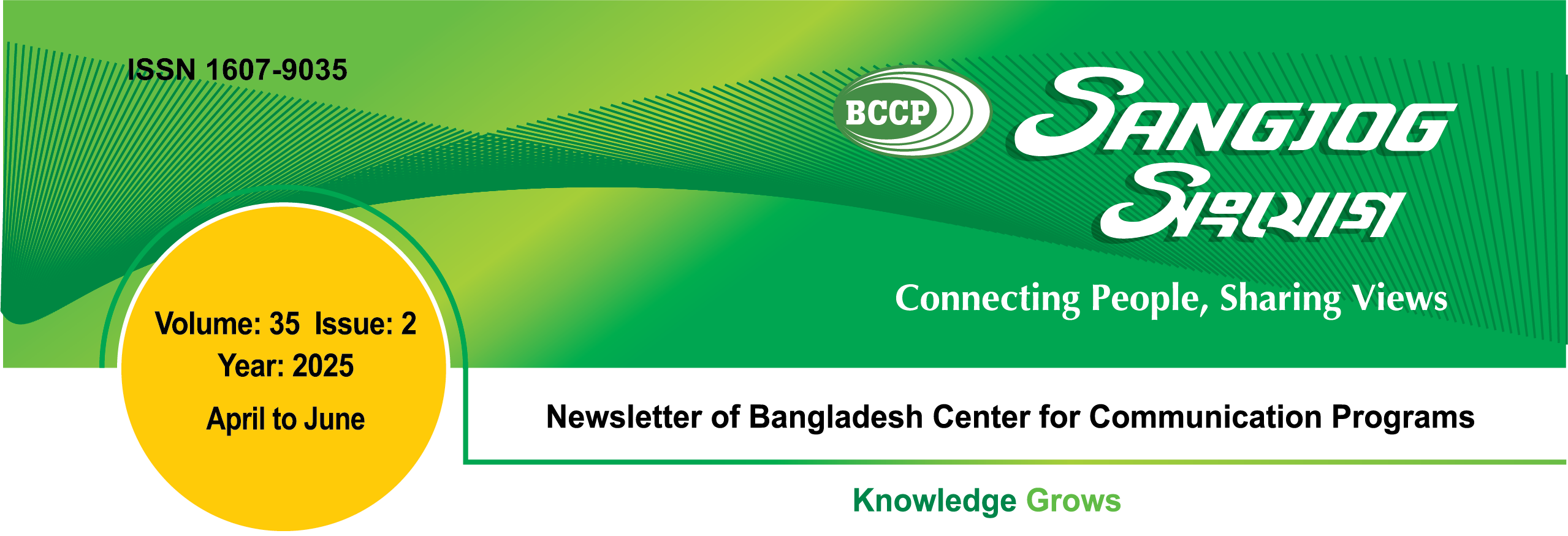
Main Article
Adolescent Mind Matters
BCCP News
Collaboration is key: Stakeholders Unite to Tackle Climate-Nutrition Challenges in Bangladesh
The Bangladesh Center for Communication Programs (BCCP), in collaboration with the National Nutrition Services (NNS) of the Directorate General of Health Services (DGHS) and with technical support from the World Health Organization (WHO), organized a critical stakeholder consultation workshop under the project titled “Vulnerability and Adaptation Assessment of Climate Change Impact on Nutrition in Bangladesh.” Held at the IEDCR conference room in Mohakhali, Dhaka, the event brought together more than 40 experts from various sectors including government, researchers, civil society, and development partners to explore urgent strategies for strengthening nutrition systems in the face of climate change. The consultation focused on understanding the growing risks climate change poses to food security and nutrition across the country. With rising temperatures affecting crop yields and exacerbating heat-related health issues, and frequent cyclones and floods destroying food stocks and damaging water quality, the impacts are already being felt, particularly in vulnerable and low-income communities. Changing rainfall patterns are further disrupting planting and harvesting cycles, jeopardizing local food systems and worsening undernutrition. Opening remarks by Prof. Dr. Anjuman Ara Sultana, Line Director of NNS, set the tone for the discussion by stressing the need for immediate, coordinated action. She warned that climate variability is already undermining food security and that its consequences will be increasingly difficult to reverse unless nutrition is integrated into climate adaptation plans. Dr. Rowshan Jahan Akter Alo, Director of the Institute of Public Health Nutrition (IPHN), echoed these concerns and highlighted that nutrition is not just a public health issue but one that intersects with agriculture and environmental sustainability. She called for strengthened multi-sectoral collaboration to ensure a unified response.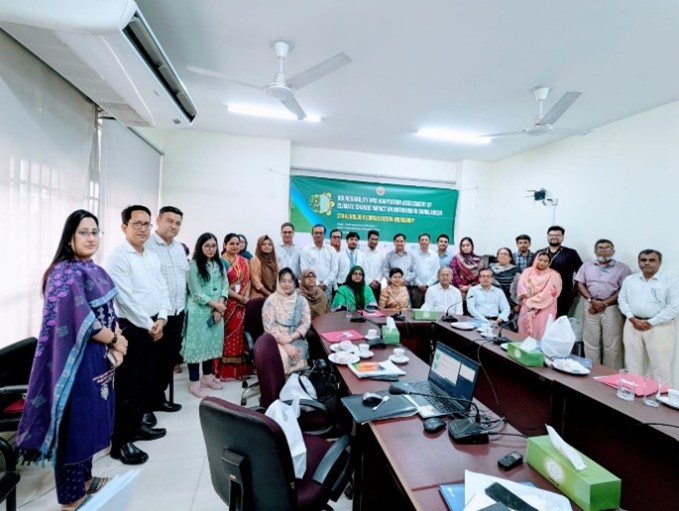 The workshop facilitated in-depth dialogue among stakeholders to prioritize feasible, context-sensitive strategies. Emphasis was placed on aligning national policies to promote climate-resilient agriculture and localized nutrition responses. Participants highlighted the urgency of improving data systems that can monitor nutritional shifts related to climate events, and the need to enhance awareness at the community level through culturally appropriate communication strategies. Strengthening early warning systems and disaster preparedness protocols that incorporate nutrition-sensitive planning was also identified as a critical need.
The workshop facilitated in-depth dialogue among stakeholders to prioritize feasible, context-sensitive strategies. Emphasis was placed on aligning national policies to promote climate-resilient agriculture and localized nutrition responses. Participants highlighted the urgency of improving data systems that can monitor nutritional shifts related to climate events, and the need to enhance awareness at the community level through culturally appropriate communication strategies. Strengthening early warning systems and disaster preparedness protocols that incorporate nutrition-sensitive planning was also identified as a critical need.
 One of the most notable outcomes of the workshop was a strategic recommendation from BCCP to establish a cross-cultural coordination mechanism between the Ministry of Health, the Ministry of Agriculture, and the Ministry of Environment, Forest and Climate Change. This proposed mechanism would serve as a platform for inter-ministerial policy integration, joint program implementation in climate-affected areas, and shared capacity-building efforts. The aim is to move beyond traditional sectoral silos and encourage a more holistic, adaptive governance model that recognizes the interconnectedness of health, agriculture, and environmental policy.
The workshop concluded with a renewed commitment from all participating agencies and stakeholders to collaborate on developing a national framework that strengthens the resilience of Bangladesh’s nutrition systems against climate change. BCCP, as a leading organization in strategic communication for development, reaffirmed its role in ensuring inclusive, evidence-based decision-making processes that support long-term climate adaptation and public health goals.
As climate change continues to reshape Bangladesh’s nutritional landscape, this workshop marks a significant step toward a more integrated and resilient response. The insights gathered here will serve as a cornerstone for future policy direction and cross-sector cooperation, ensuring that no one is left behind in the effort to secure a healthier, climate-resilient future for all.
One of the most notable outcomes of the workshop was a strategic recommendation from BCCP to establish a cross-cultural coordination mechanism between the Ministry of Health, the Ministry of Agriculture, and the Ministry of Environment, Forest and Climate Change. This proposed mechanism would serve as a platform for inter-ministerial policy integration, joint program implementation in climate-affected areas, and shared capacity-building efforts. The aim is to move beyond traditional sectoral silos and encourage a more holistic, adaptive governance model that recognizes the interconnectedness of health, agriculture, and environmental policy.
The workshop concluded with a renewed commitment from all participating agencies and stakeholders to collaborate on developing a national framework that strengthens the resilience of Bangladesh’s nutrition systems against climate change. BCCP, as a leading organization in strategic communication for development, reaffirmed its role in ensuring inclusive, evidence-based decision-making processes that support long-term climate adaptation and public health goals.
As climate change continues to reshape Bangladesh’s nutritional landscape, this workshop marks a significant step toward a more integrated and resilient response. The insights gathered here will serve as a cornerstone for future policy direction and cross-sector cooperation, ensuring that no one is left behind in the effort to secure a healthier, climate-resilient future for all.
PPA amended, e-GP use made mandatory
 The government is going to make use of e-GP mandatory for all public procurement in line with ensuring transparency and accountability for ensure value for people’s money.
The government is going to make use of e-GP mandatory for all public procurement in line with ensuring transparency and accountability for ensure value for people’s money.
Community-Driven Radio Messages to Promote Public Infrastructure Awareness
In a bid to deepen public understanding and promote sustainable use of government-built infrastructure, the Bangladesh Center for Communication Programs (BCCP), under the Emergency Multi-Sector Rohingya Crisis Response Project (EMCRP) implemented jointly by LGED, DPHE & MoDMR, developed and aired two Radio Spots as part of its Communication Awareness Services initiative.
The two spots—one tailored for a national-level audience and the other for the local community in Cox’s Bazar—were crafted to inspire a collective sense of responsibility toward EMCRP-supported public infrastructure. With themes centered on community ownership and the proper care of facilities such as roads, bridges, drainage systems, and community centers, the initiative took a culturally rooted and participatory approach to message development. What set this campaign apart was its inclusive script development process. Program people, Community members and creative writer strongly contributed to creating the content, ensuring the messages resonated with everyday experiences. The recordings featured the voices of local people, giving the spots authenticity and emotional impact that would otherwise be difficult to achieve through conventional media. The Radio spots were aired through Radio Today, one of the country’s most popular FM radio stations, utilizing multiple platforms for maximum reach. Each Radio spot aired four times a day, totaling 130 broadcasts across both campaigns. This multi-platform strategy included FM radio, the Radio Today mobile app, and the station’s official Facebook page. As a result, the campaign reached a remarkable total of 308,872 individuals. Each Radio spot was estimated (from a quick survey, immediately after airing) to have reached around 100,000 listeners via FM radio alone, while Facebook analytics recorded an additional digital reach of 108,872 users, many of whom engaged with the content through likes, shares, and comments.
By blending local voices, participatory storytelling, and modern broadcasting techniques, the campaign successfully amplified public awareness about infrastructure sustainability and accountability. It also set a new benchmark for inclusive communication practices in humanitarian and development programming in Bangladesh.
This multi-platform strategy included FM radio, the Radio Today mobile app, and the station’s official Facebook page. As a result, the campaign reached a remarkable total of 308,872 individuals. Each Radio spot was estimated (from a quick survey, immediately after airing) to have reached around 100,000 listeners via FM radio alone, while Facebook analytics recorded an additional digital reach of 108,872 users, many of whom engaged with the content through likes, shares, and comments.
By blending local voices, participatory storytelling, and modern broadcasting techniques, the campaign successfully amplified public awareness about infrastructure sustainability and accountability. It also set a new benchmark for inclusive communication practices in humanitarian and development programming in Bangladesh.
Govt emphasizes reforms in public procurement
Currently, 30 billion US dollars are spent annually on public procurement in Bangladesh. To ensure that there is no waste of this huge expenditure, the government has put stress on proper and timely implementation of various projects. On an average, about 1500 projects are included in the Annual Development Program (ADP) every year. If it is possible to achieve the goals and objectives of these projects, then it will have huge positive impact on the country's economy.
Mr. Md. Mahfuzar Rahman, Director (Joint Secretary), Bangladesh Public Procurement Authority (BPPA) said this as the chief guest at a workshop on BPPA's functions and exchange of experience on e-GP in Bhola today, April 13, 2025. Deputy Commissioner and District Magistrate Mr. Md. Azad Jahan chaired the workshop held at the conference room of the Deputy Commissioner's Office. The workshop organized by BPPA was managed by of Bangladesh Center for Communication Programs (BCCP). The news on the event was widely covered by national newspapers and news agency as well. The news links are given below. https://www.daily-sun.com/epaper/view/14/3/2025-04-14https://www.bssnews.net/business/262803
https://www.tbsnews.net/economy/corporates/bppa-hosts-workshop-public-procurement-reform-and-e-gp-integration-1114846
https://unb.com.bd/category/Bangladesh/govt-prioritises-timely-and-effective-implementation-of-dev-projects/157516
https://greenwatchbd.com/politics/74084 www.dainikamadershomoy.com/details/01962f559708
Proper audit can improve public procurement environment
BCCP managed BPPA’s workshop
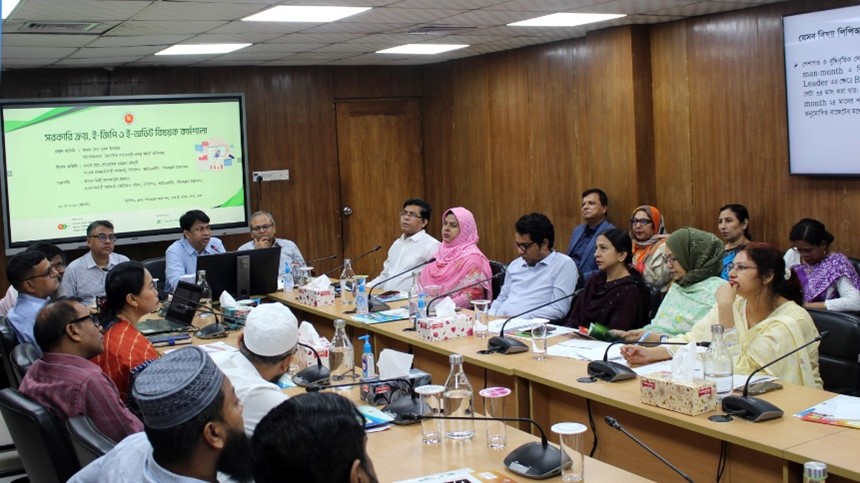 Audit officials need to have knowledge on the provisions of public procurement law and rules as proper audit is essential to check anomalies in the process of public procurement. With the strong demands for more training on public procurement for audit officials, the above observations dominated a workshop titled “Public Procurement, e-GP and e-Audit” at the conference room of the Bangladesh Public Procurement Authority (BPPA) on 28 May 2025.
Audit officials need to have knowledge on the provisions of public procurement law and rules as proper audit is essential to check anomalies in the process of public procurement. With the strong demands for more training on public procurement for audit officials, the above observations dominated a workshop titled “Public Procurement, e-GP and e-Audit” at the conference room of the Bangladesh Public Procurement Authority (BPPA) on 28 May 2025.
https://dainikamadershomoy.com/details/01971c92366e
Validation Workshop: Research Findings on Family Support and Male Engagement in MMS Adherence in Bangladesh
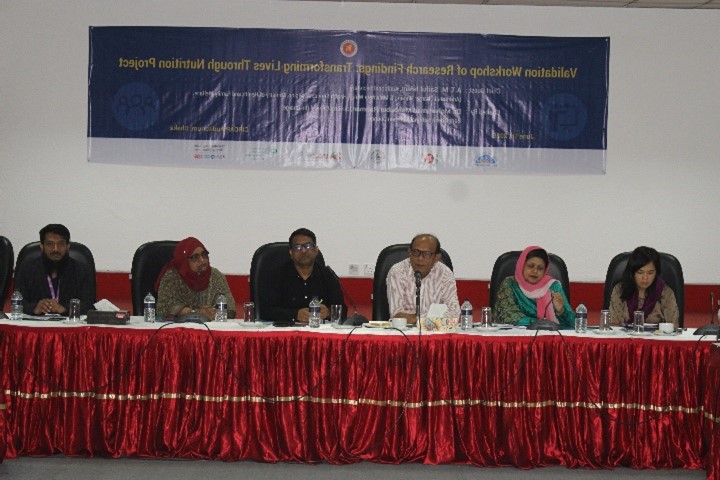 On June 16, 2025, the Bangladesh Center for Communication Programs (BCCP) organized a Validation Workshop of Research Findings at the CIRDAP Auditorium, Dhaka, as part of its project titled “Family Support and Male Engagement in MMS Adherence in Bangladesh: A COM-B Framework Analysis”. The event brought together over 55 representatives from key sectors, including policymakers, researchers, development partners, and civil society organizations. The project, overseen by the Institute of Public Health (IPHN), DGHS, and supported by Helen Keller International, aims to generate actionable insights to guide national policy and programmatic responses.
On June 16, 2025, the Bangladesh Center for Communication Programs (BCCP) organized a Validation Workshop of Research Findings at the CIRDAP Auditorium, Dhaka, as part of its project titled “Family Support and Male Engagement in MMS Adherence in Bangladesh: A COM-B Framework Analysis”. The event brought together over 55 representatives from key sectors, including policymakers, researchers, development partners, and civil society organizations. The project, overseen by the Institute of Public Health (IPHN), DGHS, and supported by Helen Keller International, aims to generate actionable insights to guide national policy and programmatic responses.
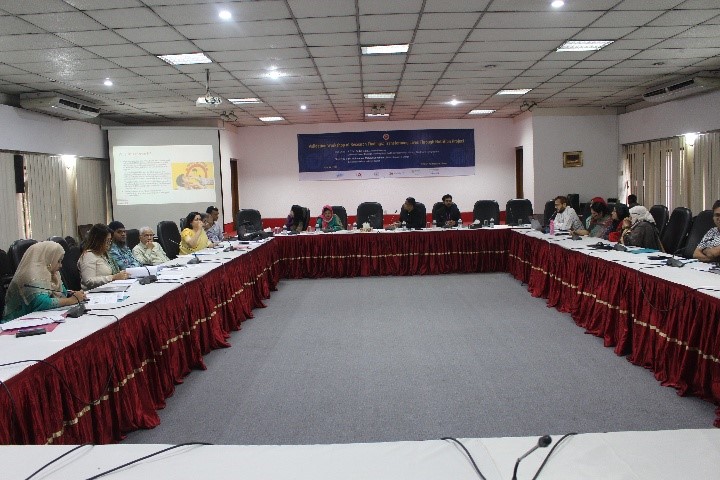 The workshop was honored by the presence of A.T.M. Saiful Islam, Additional Secretary (Additional Charge: Nursing & Midwifery Wing), Health Services Division, Ministry of Health and Family Welfare (MOHFW) as the Chief Guest. His participation underscored the government's commitment to evidence-based approaches in improving maternal health outcomes through the support of Multiple Micronutrient Supplement (MMS) across Bangladesh.
Dr. Mohammad Mahbubur Rahman, Director General (In-Charge), Bangladesh National Nutrition Council (BNNC), presided over the event as Chairperson, delivering both the speech and closing remarks. Their speech provided valuable insights into the research implications and future directions for Multiple Micronutrient Supplement (MMS) to improve maternal and child health programming in the country.
This validation workshop centered on comprehensive research findings that examined the critical role of family support systems and male engagement in improving MMS adherence among pregnant women in Bangladesh. Using the COM-B (Capability, Opportunity, Motivation-Behavior) framework, the research provided structured insights into the behavioral determinants affecting maternal nutrition supplementation.
All participants engaged in rigorous discussions to validate the research methodology, findings, and recommendations. The collaborative validation process ensured that the research conclusions accurately reflected ground realities and could inform effective policy and program interventions.
This validation workshop marks a crucial step toward developing more effective, culturally appropriate interventions for Multiple Micronutrient Supplement (MMS) to improve maternal and newborn nutrition outcomes.
The workshop was honored by the presence of A.T.M. Saiful Islam, Additional Secretary (Additional Charge: Nursing & Midwifery Wing), Health Services Division, Ministry of Health and Family Welfare (MOHFW) as the Chief Guest. His participation underscored the government's commitment to evidence-based approaches in improving maternal health outcomes through the support of Multiple Micronutrient Supplement (MMS) across Bangladesh.
Dr. Mohammad Mahbubur Rahman, Director General (In-Charge), Bangladesh National Nutrition Council (BNNC), presided over the event as Chairperson, delivering both the speech and closing remarks. Their speech provided valuable insights into the research implications and future directions for Multiple Micronutrient Supplement (MMS) to improve maternal and child health programming in the country.
This validation workshop centered on comprehensive research findings that examined the critical role of family support systems and male engagement in improving MMS adherence among pregnant women in Bangladesh. Using the COM-B (Capability, Opportunity, Motivation-Behavior) framework, the research provided structured insights into the behavioral determinants affecting maternal nutrition supplementation.
All participants engaged in rigorous discussions to validate the research methodology, findings, and recommendations. The collaborative validation process ensured that the research conclusions accurately reflected ground realities and could inform effective policy and program interventions.
This validation workshop marks a crucial step toward developing more effective, culturally appropriate interventions for Multiple Micronutrient Supplement (MMS) to improve maternal and newborn nutrition outcomes.
Government Prioritizes Making Public Procurement Time-Befitting
The government has given the highest priority to make the electronic government procurement or e-GP system more time-befitting and user-friendly through bringing necessary reforms in the public procurement law soon. Mr. Mirza Ashfaqur Rahman, Chief Executive Officer (CEO) of the Bangladesh Public Procurement Authority (BPPA) of the Implementation, Monitoring and Evaluation Division (IMED) under the Ministry of Planning made this remark at a workshop on "Sharing of experience about BPPA functions and e-GP" as the chief guest held at the DC office conference room in Moulvibazar district on 8 April 2025. Deputy Commissioner and District Magistrate of Moulvibazar Mohd. Israil Hossain chaired the workshop.
The workshop organized by BPPA was managed by of the Bangladesh Center for Communication Programs (BCCP). Deputy CEO and Program Director of BCCP attended the workshop. A total of 70 participants including representatives of procuring entities, tenderers, journalists, bankers and civil society members were present. The news of the workshop received huge media attention as a number of leading national English and Bengali newspapers, national news agency as well as online news portals published this with due importance. The news links are below. https://www.daily-sun.com/post/799525https://www.bssnews.net/business/261215
https://www.protidinersangbad.com/todays-newspaper/khobor/506420
https://www.bssnews.net/bangla/news/189707
https://dainikamadershomoy.com/details/01961614c247
https://epaper.ittefaq.com.bd/edition/1968/2nd-edition/page/13
https://dailyjalalabad.com/2025/04/370949/
https://epaper.ajkerpatrika.com/2025-04-10/edition-1/8/1400290
https://moulvibazar24.com/%e0%a6%ae%e0%a7%8c%e0
https://www.patakuri.com/%E0%A6%AE%E0%A7
Government Prioritizes Making Public Procurement Time-Befitting
The government has given the highest priority to make the electronic government procurement or e-GP system more time-befitting and user-friendly through bringing necessary reforms in the public procurement law soon. Mr. Mirza Ashfaqur Rahman, Chief Executive Officer (CEO) of the Bangladesh Public Procurement Authority (BPPA) of the Implementation, Monitoring and Evaluation Division (IMED) under the Ministry of Planning made this remark at a workshop on "Sharing of experience about BPPA functions and e-GP" as the chief guest held at the DC office conference room in Moulvibazar district on 8 April 2025. Deputy Commissioner and District Magistrate of Moulvibazar Mohd. Israil Hossain chaired the workshop.
The workshop organized by BPPA was managed by of the Bangladesh Center for Communication Programs (BCCP). Deputy CEO and Program Director of BCCP attended the workshop. A total of 70 participants including representatives of procuring entities, tenderers, journalists, bankers and civil society members were present. The news of the workshop received huge media attention as a number of leading national English and Bengali newspapers, national news agency as well as online news portals published this with due importance. The news links are below. https://www.daily-sun.com/post/799525https://www.bssnews.net/business/261215
https://www.protidinersangbad.com/todays-newspaper/khobor/506420
https://www.bssnews.net/bangla/news/189707
https://dainikamadershomoy.com/details/01961614c247
https://epaper.ittefaq.com.bd/edition/1968/2nd-edition/page/13
https://dailyjalalabad.com/2025/04/370949/
https://epaper.ajkerpatrika.com/2025-04-10/edition-1/8/1400290
https://moulvibazar24.com/%e0%a6%ae%e0%a7%8c%e0
https://www.patakuri.com/%E0%A6%AE%E0%A7
Learning more on e-GP very much crucial: Narayanganj DC
Learning more on electronic government procurement (e-GP) is very much crucial for the benefit of the country’s development activities, as this ensures transparency and accountability in the public procurement process that guarantees value for people’s money. “We must remain cautious so we can ensure proper use of public funds,” Mr. Mohammad Zahidul Islam Miah, Deputy Commissioner and District Magistrate of Narayanganj, said this at an experience-sharing workshop on BPPA activities and e-GP held on April 30, 2025 in Narayanganj.
Bangladesh Public Procurement Authority (BPPA) organized the workshop, managed by the Bangladesh Center for Communication Programs (BCCP). Ms. Laboni Chakma, Director (Deputy Secretary) of BPPA chaired the workshop. Muhammad Hafizur Rahaman, Senior Programmer, BPPA replied to queries from the tenderers and PEs present at the workshop. The news of the event was covered by a number of national newspapers and news agencies. Below are the news links. Bangladesh Sangbad Sanstha (BSS)https://www.bssnews.net/business/268449 The Business Standard
https://www.tbsnews.net/bangladesh/e-gp-be-made-mandatory-public-procurement-part-reforms-1130386 The Daily Sun
https://www.daily-sun.com/printversion/details/803033 The Daily Amader Shomoy
https://dainikamadershomoy.com/details/019686e82bc5 The Business Standard – Bangla
https://www.tbsnews.net/bangla/bangladesh/news-details-337641
Display Board Set at Sonargaon
UNO Office is Fully Aware and Operational on e-GP
The display board set at the premises of the office of Upazila Nirbahi Officer (UNO) of Sonargaon upazila of Narayanganj district has been showcasing very important messages on electronic Government Procurement (e-GP) and its uses. This makes all stakeholders and common people aware about this system, as what UNO of the upazila Farzana Rahman described, “e-GP helps make pubic procurement transparent to a great extent as our main objective is to ensure 100 percent transparency in public procurement so that no public fund is misappropriated. There is not a minimum scope for allowing manipulations in public procurement.
She made this view at an orientation program on public procurement and e-GP at the Sonargaon Upazila Parishad in Narayanganj. The program was held in the Upazila Parishad conference room. Laboni Chakma, Director (Deputy Secretary) of BPPA, attended the event as the chief guest. The orientation was organized to enhance the skills of tenderers and other stakeholders in using the e-GP system, benefiting both government procuring officials and tenderers. Muhammad Hafizur Rahaman, Senior Programmer, BPPA replied queries from the tenderers and PEs present at workshop. The BPPA approved display board was installed at the UNO office by the Bangladesh Center for Communication Programs (BCCP).Editorial: The Adolescent Mental Health Crisis
Adolescent mental health is facing a silent, global crisis. According to the World Health Organization (WHO, 2023), one in seven adolescents aged 10–19 suffers from a mental health disorder, with depression, anxiety, and behavioral issues among the leading causes of illness and disability. Alarmingly, over 75% of adolescents in low- and middle-income countries receive no treatment—putting their futures at risk. In the U.S., a 2023 CDC survey found that 42% of high school students felt persistent sadness or hopelessness, with significantly higher rates among girls (57%) and gay, bisexual, transgender, queer or questioning, and others (LGBTQ+) youth (69%). These aren’t just numbers—they represent real struggles with anxiety, trauma, and identity.
In South Asia, Bangladesh is home to 35 million adolescents—20% of its population. While the Mental Health Act of 2018 and other policies mark progress, structural barriers like stigma, poverty, and a shortage of professionals continue to block access to care. A 2023 study in the Asian Journal of Psychiatry found 25% of urban school adolescents suffer from depression—30% of girls and 19% of boys—with symptoms including sadness (45.3%), aggression (40.5%), and confusion (27.7%). The problem persists at the university level. A 2022 study in the International Journal of Environmental Research and Public Health revealed 72% of Bangladeshi university students experience depression and 40% face moderate to severe anxiety—highlighting the pressure of a high-stakes academic environment. The Power of Belief: Belief—what adolescents think about mental health—can shape everything from stigma to help-seeking. A 2021 BMC Psychiatry study found that adolescents who see mental illness as weakness are far less likely to seek support, while those who believe it's treatable are more likely to ask for help. In Bangladesh, beliefs rooted in culture, religion, and tradition strongly influence perceptions. Some still view mental illness as a spiritual or moral failing, delaying care. Yet belief in therapy, resilience, and compassion can also be powerful sources of healing. This is where communication organizations can lead change. By combining behavioral science and local storytelling, we can shift beliefs, dismantle stigma, and normalize open conversations through mass media, schools, and community platforms. What Needs to Happen Now: We should integrate mental health education into all learning spaces—from schools and madrassahs to media and digital platforms. With internet usage above 65% in Bangladesh (BTRC, 2024), tools like Moner Bondhu and helplines like Kaan Pete Roi (09611677777) should be expanded and promoted. Digital literacy is vital to fight online harm and promote healthy screen use. Teachers should be trained in trauma-informed care. Parents need resources to create safe, supportive homes. Community and religious leaders—when informed—can become powerful allies for change. A Call to Believe and Act: Bangladesh has the tools, the laws, and the passion. What we need is belief—in the urgency of the issue and in the potential of our youth. When we believe adolescents are more than their grades or their worst days, we help raise a generation that values its worth, trusts one another and seeks help without shame.Because every adolescent mind matters—and every step we take today builds a more resilient, compassionate Bangladesh tomorrow.
ICT and innovation

10 prompt engineering tips to get better AI responses
Ever wondered why some people get brilliant results from AI tools like Gemini, while others receive gibberish? The secret lies in prompt engineering, the craft of designing clear, practical instructions for AI systems. read more...

Move over SpaceX. Bangladesh has its own rockets now
Bangladeshi aerospace company DhumketuX has officially unveiled Bidrohi, a domestically built commercial sub-orbital space rocket made in Bangladesh, on 29 April.Named after the celebrated poem Bidrohi by national poet Kazi Nazrul Islam, the rocket has been positioned by its developers as a symbol of Bangladesh's growing ambition in science and technology. read more...

Meta releases standalone AI app, competing with ChatGPT
Social media behemoth Meta unveiled its first standalone AI assistant app on Tuesday, challenging ChatGPT by giving users a direct path to its generative artificial intelligence models."A billion people are using Meta AI across our apps now, so we made a new standalone Meta AI app for you to check out," the company's CEO and founder Mark Zuckerberg said in a video posted on Instagram. read more...

AI-first company now rehiring human staff after quality drop
Klarna, a Swedish fintech company, once bragged that its AI could replace 700 customer service jobs, but is now scrambling to rehire human workers after its chatbot experiment backfired. Just months after freezing hiring and letting its workforce shrink by 22% through attrition, CEO Sebastian Siemiatkowski admitted the company's aggressive AI shift sacrificed service quality. read more...

DeepSeek quietly updates its R1 reasoning model
Chinese AI startup DeepSeek has released an update to its R1 reasoning model. The new version, named R1-0528, was published on developer platform Hugging Face on May 29, although the company has not yet issued an official announcement, as per a recent Reuters repor read more...

The future of coding: AI startups challenge Big Tech’s grip
Two years after ChatGPT kickstarted the generative AI revolution, one area stands out for actually making money — writing code. A wave of AI startups is racing to reshape software development by automating the grunt work of programming, and investors are pouring in billions to back the early frontrunners. read more...

WhatsApp users can now create AI images with ChatGPT: 3 easy steps
OpenAI has brought ChatGPT image generation capabilities to the world’s most popular instant messaging application – WhatsApp. Until now, the feature was only available to users through ChatGPT web and mobile apps.With the feature coming to WhatsApp, it will now allow more users to amplify their creativity. read more...

Govt turns to AI for faster delivery of projects
Bangladesh plans to launch a Tk 316 crore reform programme aimed at significantly speeding up project planning, approval, and implementation through the use of artificial intelligence for the first time. read more...
Scoop News: International Publications

Fungal infections are ‘taking over the world’. Can they be stopped?
Blood congealed “like black sausage”, sexually-transmitted athlete’s foot, and bloodstream-born pathogens untreatable with existing drugs. These are the kinds of fungal infections Professor Darius Armstrong-James, Infectious Diseases and Medical Mycology at Imperial College London, is used to treating. read more...

Scientists find strongest evidence yet of life on an alien planet
WASHINGTON, April 16 (Reuters) - In a potential landmark discovery, scientists using the James Webb Space Telescope have obtained what they call the strongest signs yet of possible life beyond our solar system, detecting in an alien planet's atmosphere the chemical fingerprints of gases that on Earth are produced only by biological processes. The two gases - dimethyl sulfide, or DMS, and dimethyl disulfide read more...

Gravity study shows why the moon's two sides look so different
WASHINGTON, May 14 (Reuters) - An exhaustive examination of lunar gravity using data obtained by two NASA robotic spacecraft is offering new clues about why the two sides of the moon - the one perpetually facing Earth and the other always facing away - look so different. The data from the U.S. space agency's GRAIL, or Gravity Recovery and Interior Laboratory read more...

Four billion people endured extra month of extreme heat last year due to climate change, experts say
Human-caused climate change added an average of 30 days of extreme heat for about half of the world’s population over the past year, according to a new study. That amounts to four billion people exposed to prolonged, dangerous temperatures. And the findings single out fossil fuel emissions as the cause of the blistering heat. The study, published ahead of Heat Action Day on 2 June read more...

Humans aren’t built to remember everything. 5 tips to remember the important stuff
Most of us are familiar with the frustration of forgetting — whether it’s struggling with a word on the tip of the tongue, misplacing important items such as keys or glasses, or even disremembering why you came into a room. read more...

First celestial image unveiled from revolutionary telescope
A powerful new telescope in Chile has released its first images, showing off its unprecedented ability to peer into the dark depths of the universe. In one picture, vast colourful gas and dust clouds swirl in a star-forming region 9,000 light years from Earth. The Vera C Rubin observatory, home to the world's most powerful digital camera, promises to transform our understanding of the universe. read more...

Covid origins investigation inconclusive, says WHO
A long-running World Health Organization investigation into the origins of Covid-19 has been unable to conclude where the virus came from because of a refusal to share information by China and intelligence agencies. read more...
 Writer: Dr. Sirajam Munira Oreen
Writer: Dr. Sirajam Munira Oreen 






